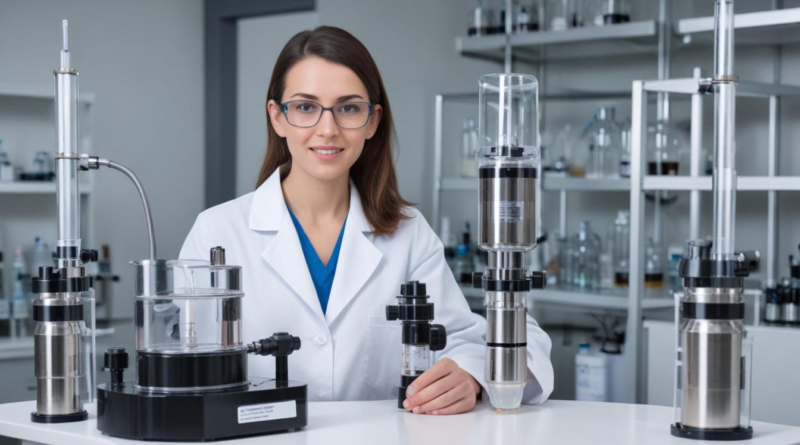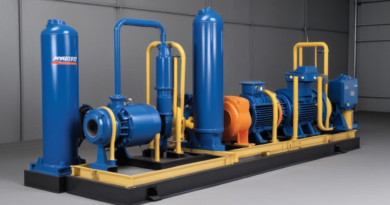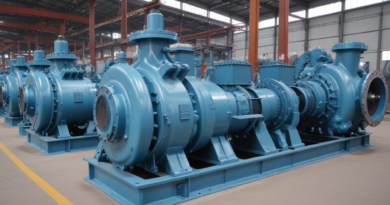the benefits of using magnetic drive pumps in biotech
Magnetic drive pumps operate through a sophisticated mechanism that eliminates the need for traditional mechanical seals, enhancing both efficiency and reliability. Central to their functionality are two primary magnets: one attached to the motor and the other to the pump impeller. This magnetic coupling facilitates the transfer of torque from the motor to the impeller without any direct physical connection.
The operation can be broken down into the following key components and processes:
- Drive Magnet: Mounted on the motor shaft, it generates a rotating magnetic field when activated.
- Impeller Magnet: Attached to the pump impeller, it responds to the magnetic field produced by the drive magnet, causing the impeller to rotate.
- Pump Casing: Encases the magnets and the fluid being pumped, ensuring a sealed environment that prevents leaks.
When the motor is energized, the drive magnet creates a magnetic field that penetrates the pump casing. This field interacts with the impeller magnet, inducing its rotation and thereby moving the fluid through the pump. The absence of a direct mechanical seal means there are no wear points where leaks could occur, significantly reducing maintenance requirements and enhancing the pump’s longevity.
Additionally, the design of magnetic drive pumps allows for smooth and consistent operation, minimizing vibrations and mechanical stresses. The following table outlines the interaction between the components:
| Component | Function |
|---|---|
| Drive Magnet | Generates the magnetic field necessary for torque transmission. |
| Impeller Magnet | Rotates in response to the drive magnet’s field, facilitating fluid movement. |
| Pump Casing | Provides a secure environment that contains the fluid and magnets. |
| Motor | Supplies the mechanical energy required to drive the pump. |
This innovative approach not only enhances the benefits of using magnetic drive pumps in various applications but also makes them particularly suitable for the biotech industry, where maintaining a contamination-free environment is paramount. The seamless transfer of torque without direct contact ensures that the integrity of sensitive bioprocesses is upheld, making magnetic drive pumps a preferred choice in demanding settings.
key benefits in biotech applications
In the demanding landscape of the biotech industry, selecting the right equipment is paramount to ensuring the success and integrity of various processes. Magnetic drive pumps offer a suite of advantages that align seamlessly with the rigorous standards and specific needs of biotech applications. These benefits not only enhance operational efficiency but also contribute to the overall quality and safety of bioprocesses.
One of the foremost advantages is the prevention of contamination. Traditional pumps with mechanical seals can be a source of leaks and contaminants, which is particularly detrimental in biotech environments where even minor impurities can compromise product integrity. By eliminating mechanical seals, magnetic drive pumps ensure a sealed environment, significantly reducing the risk of contamination and maintaining the sterility required for sensitive biological materials.
Furthermore, process reliability and consistency are critical in biotech operations. Magnetic drive pumps are engineered for continuous and stable performance, minimizing fluctuations in flow rates and pressures. This consistency is vital for processes such as fermentation, chromatography, and cell culture, where precise control can directly impact the yield and quality of the final product.
The compatibility with a wide range of fluids is another key benefit. Biotech processes often involve handling aggressive chemicals, bioactive substances, and corrosive fluids. Magnetic drive pumps are constructed from materials that resist corrosion and are compatible with these challenging substances, ensuring longevity and reducing the need for frequent replacements or maintenance.
Scalability and flexibility are also significant advantages. As biotech companies grow and their production needs evolve, magnetic drive pumps can be easily scaled to accommodate increased volumes or adapted to different processes without substantial modifications. This flexibility is essential for biotech firms that must remain agile in response to scientific advancements and market demands.
Additionally, these pumps facilitate regulatory compliance by maintaining high standards of hygiene and operational integrity. The ability to maintain a contamination-free environment aligns with the stringent regulatory requirements of agencies such as the FDA and EMA, thereby simplifying the validation and approval processes for biotech products.
The following table summarizes the key benefits of using magnetic drive pumps in biotech applications:
| Benefit | Description |
|---|---|
| Contamination Prevention | Eliminates mechanical seals to prevent leaks and contamination, ensuring sterility of bioprocesses. |
| Process Reliability | Provides continuous and stable performance, maintaining consistent flow rates and pressures. |
| Fluid Compatibility | Handles a wide range of aggressive and corrosive fluids with materials resistant to chemical degradation. |
| Scalability | Offers flexibility to scale operations and adapt to evolving production needs without major modifications. |
| Regulatory Compliance | Supports adherence to stringent hygiene and operational standards required by regulatory bodies. |
Moreover, the energy efficiency of magnetic drive pumps plays a crucial role in biotech applications, where operational costs can significantly impact overall project feasibility. These pumps are designed to operate with minimal energy consumption while delivering optimal performance, thereby contributing to substantial cost savings over time.
In summary, the benefits of utilizing magnetic drive pumps in biotech are multifaceted, encompassing enhanced contamination control, reliable and consistent performance, compatibility with a diverse array of fluids, scalability, and compliance with regulatory standards. These advantages make magnetic drive pumps an invaluable asset in biotech settings, supporting the advancement of innovative biological solutions with heightened efficiency and safety.
enhancing safety and reducing contamination
In the biotech industry, maintaining stringent safety standards and minimizing the risk of contamination are critical to ensuring product integrity and compliance with regulatory requirements. Magnetic drive pumps play a pivotal role in achieving these objectives through their innovative design and operational mechanisms.
One of the primary ways these pumps enhance safety is by eliminating mechanical seals, which are common points of failure in traditional pump systems. Mechanical seals are prone to wear and leakage, which can lead to the unintended release of hazardous or sensitive biological materials. By removing these seals, magnetic drive pumps significantly reduce the likelihood of leaks, thereby safeguarding both the environment and the integrity of the bioprocess.
Key features contributing to enhanced safety and reduced contamination include:
- Sealed Containment: The entire pumping mechanism is enclosed, preventing any direct contact between the fluid and external components. This containment ensures that contaminants cannot enter the system and that the processed material remains pure.
- Corrosion-Resistant Materials: Constructed from materials such as stainless steel and specialized polymers, magnetic drive pumps resist corrosion and degradation, which can otherwise introduce impurities into biotech processes.
- Hygienic Design: Smooth surfaces and minimal crevices facilitate easy cleaning and sterilization, reducing the risk of microbial contamination.
- Non-Electromagnetic Interference: The absence of direct mechanical connections minimizes electromagnetic interference, which is crucial for sensitive biotech applications that rely on precise measurements and controls.
Moreover, the reliability of magnetic drive pumps contributes to overall process safety. Their ability to operate continuously without frequent maintenance or unexpected downtime ensures that bioprocesses remain stable and controlled. This consistency is vital in environments where even minor fluctuations can have significant repercussions on product quality and safety.
The following table highlights the safety and contamination control features of magnetic drive pumps:
| Feature | Description |
|---|---|
| Elimination of Mechanical Seals | Prevents leaks and reduces contamination risks by removing common failure points. |
| Sealed Containment | Ensures that fluids are fully contained within the pump, maintaining process purity. |
| Corrosion-Resistant Materials | Uses materials that withstand aggressive biochemicals, preventing material degradation and contamination. |
| Hygienic Design | Facilitates thorough cleaning and sterilization, minimizing microbial growth and contamination. |
| Process Reliability | Provides stable and continuous operation, ensuring consistent process conditions and product quality. |
Additionally, fail-safe mechanisms incorporated into magnetic drive pumps further enhance operational safety. These mechanisms can detect and respond to abnormal conditions, such as overpressure or temperature fluctuations, by automatically shutting down the pump or alerting operators. This proactive approach to safety helps prevent potential accidents and ensures that any issues are promptly addressed before they escalate.
In summary, the design and functionality of magnetic drive pumps offer substantial benefits in enhancing safety and reducing contamination within biotech applications. Their ability to maintain a secure and controlled environment not only protects the integrity of bioprocesses but also aligns with the rigorous regulatory standards that govern the biotech industry.
energy efficiency and cost savings
 Magnetic drive pumps are engineered to deliver exceptional energy efficiency, which is a crucial factor in the operational economics of biotech facilities. Their design inherently reduces energy consumption by minimizing friction and eliminating the energy losses associated with traditional mechanical seals and ancillary components. This streamlined operation not only optimizes performance but also translates directly into significant cost savings over time.
Magnetic drive pumps are engineered to deliver exceptional energy efficiency, which is a crucial factor in the operational economics of biotech facilities. Their design inherently reduces energy consumption by minimizing friction and eliminating the energy losses associated with traditional mechanical seals and ancillary components. This streamlined operation not only optimizes performance but also translates directly into significant cost savings over time.
One of the primary contributors to the energy efficiency of magnetic drive pumps is the absence of mechanical seals. Traditional pumps rely on these seals to contain the fluid, which introduces additional friction and requires continuous energy input to maintain the seal integrity. By leveraging magnetic coupling, magnetic drive pumps eliminate the need for these seals, resulting in smoother operation with reduced energy demand. This efficiency is particularly beneficial in biotech applications where pumps often run continuously, leading to substantial energy savings on a large scale.
Furthermore, the reduced number of moving parts in magnetic drive pumps lowers the mechanical complexity, decreasing internal energy losses and enhancing overall system efficiency. The precise control offered by these pumps allows for optimal flow rates and pressure management, ensuring that energy is utilized effectively without wastage. This precision not only improves process outcomes but also contributes to lower utility costs, a critical consideration in energy-intensive biotech environments.
The economic advantages extend beyond operational energy savings. Magnetic drive pumps are associated with lower maintenance requirements due to their simplified design and reduced wear and tear. Traditional pumps with mechanical seals often necessitate frequent maintenance and part replacements, incurring additional labor and material costs. In contrast, the maintenance-free nature of magnetic drive pumps minimizes downtime and reduces the total cost of ownership, providing long-term financial benefits to biotech enterprises.
The following table highlights the comparative energy efficiency and cost implications between magnetic drive pumps and traditional pump systems:
| Aspect | Magnetic Drive Pumps | Traditional Pumps |
|---|---|---|
| Energy Consumption | Lower due to elimination of mechanical seals and reduced friction | Higher due to mechanical seals and increased friction |
| Maintenance Costs | Minimal maintenance required, leading to reduced costs | Frequent maintenance and part replacements needed |
| Operational Downtime | Reduced downtime with reliable, continuous operation | Higher downtime due to maintenance and repairs |
| Total Cost of Ownership | Lower over the pump’s lifespan | Higher due to ongoing maintenance and energy costs |
Additionally, the longevity of magnetic drive pumps further contributes to cost savings. Their robust construction and resistance to wear ensure a longer operational life compared to traditional pumps. This durability reduces the frequency of pump replacements, deferring capital expenditures and enhancing the return on investment for biotech companies.
In summary, the energy efficiency of magnetic drive pumps offers substantial cost savings for biotech applications. By minimizing energy consumption, reducing maintenance requirements, and extending pump lifespan, these pumps provide a financially advantageous solution that supports the sustainable and cost-effective operation of biotech processes.
maintenance and longevity advantages
Magnetic drive pumps offer significant advantages in terms of maintenance and longevity, making them an ideal choice for the demanding environment of the biotech industry. Their innovative design minimizes wear and tear, reduces the need for frequent maintenance, and extends the overall lifespan of the equipment.
One of the primary factors contributing to the reduced maintenance requirements is the elimination of mechanical seals. Traditional pumps with mechanical seals are prone to leakage and require regular inspection and replacement to prevent contamination and ensure continuous operation. In contrast, magnetic drive pumps use a magnetic coupling to transfer torque, which eliminates the need for these seals and thereby reduces potential failure points.
Key aspects of maintenance and longevity advantages include:
- Fewer Moving Parts: By removing components such as mechanical seals and shaft seals, magnetic drive pumps have fewer parts that can wear out or fail, leading to decreased maintenance needs.
- Corrosion Resistance: Constructed from corrosion-resistant materials like stainless steel and specialized polymers, these pumps withstand harsh chemical environments common in biotech processes, preventing degradation and extending their operational life.
- Self-Lubricating Components: Many magnetic drive pumps incorporate self-lubricating bearings and seals, which reduce friction and wear, further minimizing maintenance requirements and enhancing durability.
- Easy Accessibility: The design of magnetic drive pumps often allows for easier access to internal components, simplifying routine inspections and maintenance tasks without extensive downtime.
The longevity of magnetic drive pumps translates into several tangible benefits for biotech applications:
- Extended Operational Life: The robust construction and reduced wear contribute to a longer lifespan, ensuring that pumps remain functional and reliable over extended periods.
- Reduced Downtime: With fewer maintenance requirements and less frequent need for repairs, biotech processes experience less interruption, maintaining high levels of productivity.
- Cost Savings: Lower maintenance costs and extended replacement intervals lead to significant financial savings, allowing biotech companies to allocate resources more efficiently.
- Consistent Performance: Maintaining optimal pump performance over time ensures that bioprocesses remain stable and reliable, which is crucial for achieving consistent product quality.
The following table summarizes the maintenance and longevity benefits of magnetic drive pumps compared to traditional pump systems:
| Aspect | Magnetic Drive Pumps | Traditional Pumps |
|---|---|---|
| Number of Moving Parts | Fewer, resulting in lower wear and fewer failure points | More, leading to increased maintenance and higher risk of leaks |
| Maintenance Frequency | Minimal due to streamlined design and durable materials | Higher, requiring regular inspections and seal replacements |
| Lifespan | Longer due to robust construction and corrosion resistance | Shorter, with more components susceptible to wear and corrosion |
| Operational Downtime | Reduced, ensuring continuous and reliable bioprocesses | Increased, potentially disrupting critical biotech operations |
| Total Cost of Ownership | Lower over time due to reduced maintenance and longer lifespan | Higher, driven by ongoing maintenance and more frequent replacements |
Moreover, the predictive maintenance capabilities of modern magnetic drive pumps enhance their longevity. Advanced monitoring systems can track performance metrics in real-time, allowing for proactive maintenance actions before potential issues escalate into significant problems. This approach not only extends the lifespan of the pumps but also ensures that biotech processes remain uninterrupted and efficient.
In conclusion, the maintenance and longevity advantages of magnetic drive pumps provide substantial benefits for the biotech industry. Their durable construction, reduced maintenance needs, and extended operational life contribute to enhanced reliability, cost savings, and sustained high performance in critical bioprocesses.




